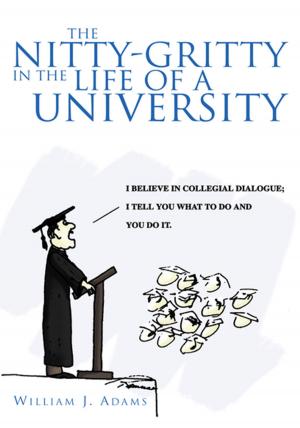Wisdom, Consciousness, and the Future
Collected Essays
Nonfiction, Religion & Spirituality, Philosophy| Author: | Thomas Lombardo | ISBN: | 9781462883622 |
| Publisher: | Xlibris US | Publication: | June 17, 2011 |
| Imprint: | Xlibris US | Language: | English |
| Author: | Thomas Lombardo |
| ISBN: | 9781462883622 |
| Publisher: | Xlibris US |
| Publication: | June 17, 2011 |
| Imprint: | Xlibris US |
| Language: | English |
Wisdom, Consciousness, and the Future:
Collected Essays
Thomas Lombardo, Ph. D.
Center for Future Consciousness
Wisdom, Consciousness, and the Future is a profound, deeply important, and timely book that concerned people and change agents everywhere will want to read.
Copthorne Macdonald
The Wisdom Page
As a college professor and teacher of psychology, philosophy, and the future, Tom Lombardos mind has been drawn toward such questions as:
How will the human mind evolve in the future? In fact, how should the human mind evolve and improve itself?
What might be the standards and ideals that guide this evolution?
And what role does ethical development (or evolution) play in this process?
The twenty previously published articles collected together in Wisdom, Consciousness, and the Future chronicle the development of Dr. Lombardos ideas on these related questions and topics, and together constitute a theoretical perspective on the nature of the human mind, on how to best educate and evolve the human mind in the future, and how to integrate into this vision the central importance of both future consciousness (as a key dimension of human consciousness) and ethical character virtues.
True to its title, three key themes emerge in this collection: wisdom, consciousness, and the future, and all three concepts tie into the authors main contribution to the field of futures studies, future consciousness. Numerous essays (for example, Evolving Future Consciousness through the Pursuit of Virtue and The Evolution and Psychology of Future Consciousness) address the nature of future consciousness, a term Dr. Lombardo defines as the complex set of mental capacities all humans possess for imagining, conceptualizing, and approaching the future. Aside from describing the psychological make-up of future consciousness, which includes emotional, motivational, cognitive, and personal dimensions, the author also explains in numerous essays (such as Developing Constructive and Creative Attitudes about the Future) how to proactively enhance ones future consciousness. Other essays deal directly with consciousness and the human mind in the broadest sense (as in The Future Evolution of the Ecology of Mind) and connect this general area of inquiry with the futurist question of how consciousness and mind might evolve in the future. Dr. Lombardo proposes that the progressive emergence of cosmic consciousness is the central evolutionary trajectory of the human mind. Hence, this book contains essays on both consciousness of the future and consciousness in the future.
While the discussion of consciousness and the future fascinates in its own right, Dr. Lombardo is a holistic and deep thinker who searches for connections among myriad philosophical topics. A number of essays address the question of ethics and virtue and how such concepts connect with both future consciousness and the evolution of consciousness in the future. He then expands on this theme to explore how virtue applies to the goals of higher education in essays such as Ethical Character Development and Personal and Academic Excellence. In thinking through the concept of virtue and how it applies to consciousness, education, and the future, Dr. Lombardo emphasizes the one key virtuewisdomthat provides the center of gravity around which all other character virtues revolve. Indeed, if any one concept unites the majority of essays in this collection, it is wisdom. In The Wisdom of Future Consciousness, the author argues that wisdom is the highest expression of future consciousness, and systematically describes the numerous connections between wisdom and heightened future consciousness. Further, according to the author, wisdom is the key ideal that we should model and teach within education, now and in the future. This argume
Wisdom, Consciousness, and the Future:
Collected Essays
Thomas Lombardo, Ph. D.
Center for Future Consciousness
Wisdom, Consciousness, and the Future is a profound, deeply important, and timely book that concerned people and change agents everywhere will want to read.
Copthorne Macdonald
The Wisdom Page
As a college professor and teacher of psychology, philosophy, and the future, Tom Lombardos mind has been drawn toward such questions as:
How will the human mind evolve in the future? In fact, how should the human mind evolve and improve itself?
What might be the standards and ideals that guide this evolution?
And what role does ethical development (or evolution) play in this process?
The twenty previously published articles collected together in Wisdom, Consciousness, and the Future chronicle the development of Dr. Lombardos ideas on these related questions and topics, and together constitute a theoretical perspective on the nature of the human mind, on how to best educate and evolve the human mind in the future, and how to integrate into this vision the central importance of both future consciousness (as a key dimension of human consciousness) and ethical character virtues.
True to its title, three key themes emerge in this collection: wisdom, consciousness, and the future, and all three concepts tie into the authors main contribution to the field of futures studies, future consciousness. Numerous essays (for example, Evolving Future Consciousness through the Pursuit of Virtue and The Evolution and Psychology of Future Consciousness) address the nature of future consciousness, a term Dr. Lombardo defines as the complex set of mental capacities all humans possess for imagining, conceptualizing, and approaching the future. Aside from describing the psychological make-up of future consciousness, which includes emotional, motivational, cognitive, and personal dimensions, the author also explains in numerous essays (such as Developing Constructive and Creative Attitudes about the Future) how to proactively enhance ones future consciousness. Other essays deal directly with consciousness and the human mind in the broadest sense (as in The Future Evolution of the Ecology of Mind) and connect this general area of inquiry with the futurist question of how consciousness and mind might evolve in the future. Dr. Lombardo proposes that the progressive emergence of cosmic consciousness is the central evolutionary trajectory of the human mind. Hence, this book contains essays on both consciousness of the future and consciousness in the future.
While the discussion of consciousness and the future fascinates in its own right, Dr. Lombardo is a holistic and deep thinker who searches for connections among myriad philosophical topics. A number of essays address the question of ethics and virtue and how such concepts connect with both future consciousness and the evolution of consciousness in the future. He then expands on this theme to explore how virtue applies to the goals of higher education in essays such as Ethical Character Development and Personal and Academic Excellence. In thinking through the concept of virtue and how it applies to consciousness, education, and the future, Dr. Lombardo emphasizes the one key virtuewisdomthat provides the center of gravity around which all other character virtues revolve. Indeed, if any one concept unites the majority of essays in this collection, it is wisdom. In The Wisdom of Future Consciousness, the author argues that wisdom is the highest expression of future consciousness, and systematically describes the numerous connections between wisdom and heightened future consciousness. Further, according to the author, wisdom is the key ideal that we should model and teach within education, now and in the future. This argume















